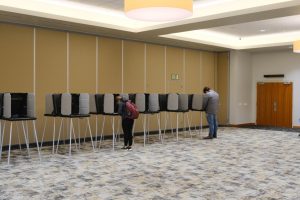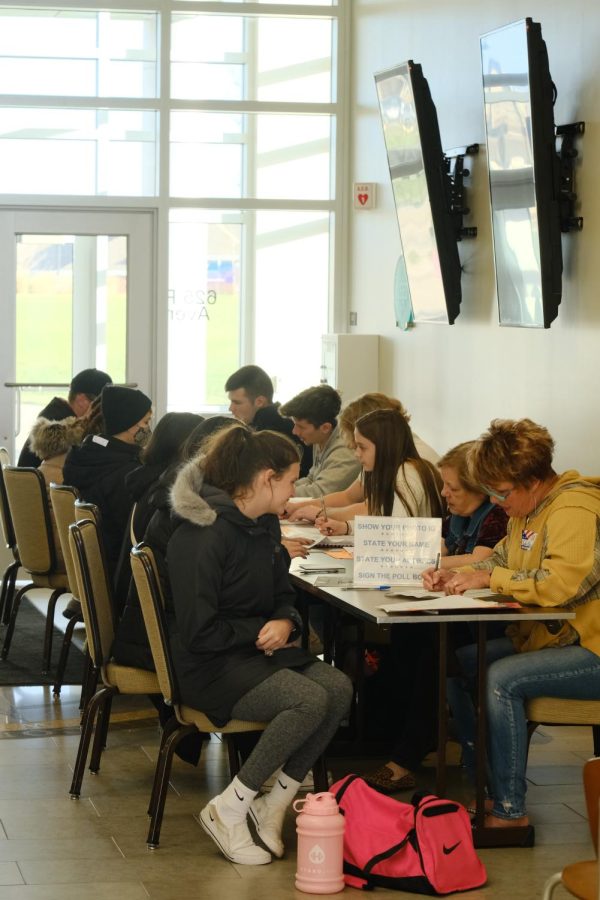Titans cast a vote for their future
Liam Beran / The Advance-Titan– Students vote at Culver Family Welcome Center. (Bottom left) Poll workers assist students before they cast their ballot.
November 9, 2022
It was a first-time experience for some UW Oshkosh students. Nov. 8’s Election Day marked an entry to voting for much of the student population.
“Midterm elections tend to be less popular than presidential elections,” said James Krueger, a political science professor at UWO. Speaking prior to the election, Krueger said student turnout tends to vary on the visibility and perceived closeness of an election, but that the closeness of many races this fall made it a “high visibility election.”
“Students tend to turn out a little less commonly than the average population,” Krueger said. He noted that students are typically younger, less experienced with voting and may feel like voting doesn’t affect them. Yet Krueger also recognized that organizations on campus have been pushing the importance of voting and that these efforts may increase a student’s likelihood to vote.
Politics affect students, Krueger said. “Their rent is determined on taxes, the cost of their tuition and the deals that they get in terms of tuition remission or forgiveness of student loans is dependent on who is in office both in Madison and in Washington, D.C.”
He added, “Whether they care about their pocket book, social or moral issues – all of these things are something they’re empowered to have a choice about.”
A variety of issues were on students’ minds. Lily Slivinski, a third-year RTF major, said reproductive rights and climate concerns were the two main issues she was voting for.
“I’ve voted since I was able to vote,” Slivinski said. “But for this election, in particular, I think it’s important for everyone to vote because it’s such a tight race in every race.”
This year’s voting took place among a national conversation about the role of election observers, who have ignited fierce ideological and legal debates in recent weeks, with some accusing election observers of practicing voter intimidation. In Arizona, a district court judge issued a temporary restraining order on open-carrying election observers at ballot boxes, as reported by the New York Times. In Green Bay, Fox 11 News reported that the Republican National Committee and four individuals filed a lawsuit “seek[ing] a temporary restraining order and injunction” against city clerk Celestine Jeffreys, alleging Jeffreys “refused to let election observers be in a public hallway where voters fill out their ballot, have witness certification performed and deposit the ballot into the ballot box.”
The city of Oshkosh did have election observers on sites, even in City Hall for those who chose to cast their ballots early. An election observer was also watching over the voting process at the Culver Family Welcome Center, where on-campus students cast their ballots.
Winnebago County Clerk Sue Ertmer said that issues were minimal, but that in the city of Neenah, an individual was escorted out by the police for becoming “unruly” toward election observers watching him. According to Ertmer, the individual wanted to become an observer after voting and election officials called the police on him for being “too rambunctious.”
According to a March 2022 election brochure distributed by the Wisconsin Elections Commission, election observers are allowed to observe polling places so long as they do not engage in electioneering, defined by Wisconsin statute § 12.03 as “any activity which is intended to influence voting at an election.”

While unofficial results were available Tuesday night, the outcome of the election isn’t official until a certification process occurring Thursday evening, said Oshkosh City Clerk Jessi Balcom.
Late Tuesday night, Winnebago Deputy County Clerk Julie Barthels said they were waiting on a call from one polling place, which had more than 100 people still in line at 8:30 p.m., to complete the county’s tally.
Though votes were still being counted at the time, Ertmer was enthusiastic about turnout. “Just preliminary numbers, [but] some of [the wards] were thinking they had presidential numbers.” Ertmer said that numbers were still up in the air late Tuesday night, but that she could see a 75% or 80% turnout for Winnebago County.
Still turnout was slightly lower compared to the November 2018 election, according to the Winnebago County unofficial results. About 75,000 people voted this Tuesday, down 1,100 people or 1.4%.
In unofficial results, Democratic candidate Lori Palmeri, the current mayor of Oshkosh, will represent the 54th Assembly District, winning her race against Republican opponent Donnie Herman, an Oshkosh businessman. Palmeri accrued 12,124 votes or 53.1% of the total votes cast. Herman had 10,382 votes or 45.6% of the total votes cast. Palmeri replaces Democrat Gordon Hintz who decided not to run for re-election.
State-wide results came in slowly. Shortly after midnight Wednesday, Republican challenger Tim Michels conceded the gubernatorial race to incumbent Tony Evers. Evers had 1 ,355,409 votes, or 51.2% of total votes cast, compared to Michel’ 1,265,846 votes. In Winnebago County, Michels led in the gubernatorial race against Evers by about 729 votes.
A few hours later, with about 99% of the votes counted, Incumbent Attorney General Josh Kaul narrowly defeated his Republican challenger Eric Toney with 1,329,852 votes, or 50.6% of the votes cast. Toney had 1,295,709 votes, or 49.4% of total votes. In Winnebago County, Toney led Kaul by almost 1,600 votes.
The real nail-biter, however, was the U.S. Senate race. By mid-morning Wednesday, Republican Ron Johnson was leading Mandela Barnes by about 25,000 votes with 98% of votes counted; shortly after, NBC News called the race for Johnson. Barnes conceded later in the afternoon. In Winnebago County, voters supported Johnson by about 4,500 votes.
Editor’s Note: This story was updated as vote totals came in.














